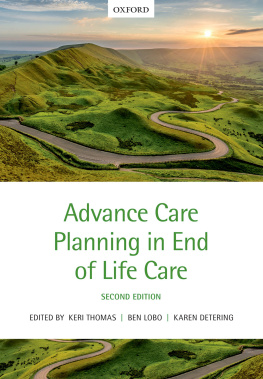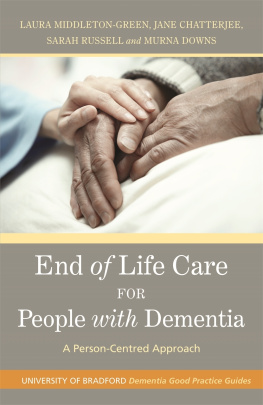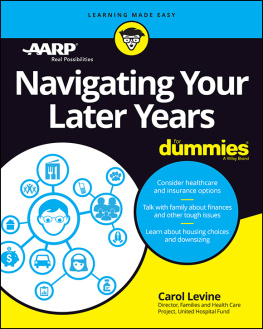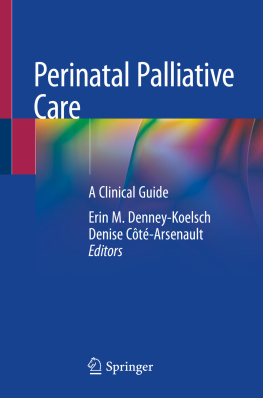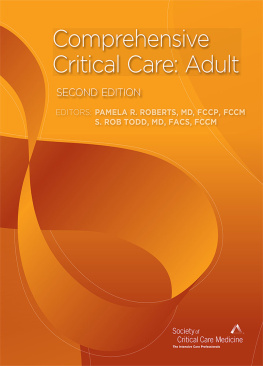Advance Care Planning
in End of Life Care

Great Clarendon Street, Oxford, OX2 6DP, United Kingdom
Oxford University Press is a department of the University of Oxford.
It furthers the Universitys objective of excellence in research, scholarship, and education by publishing worldwide. Oxford is a registered trade mark of Oxford University Press in the UK and in certain other countries
Oxford University Press 2018
The moral rights of the authors have been asserted
First edition published 2011Second edition published 2018
Impression: 1
All rights reserved. No part of this publication may be reproduced, stored in a retrieval system, or transmitted, in any form or by any means, without the prior permission in writing of Oxford University Press, or as expressly permitted by law, by licence or under terms agreed with the appropriate reprographics rights organization. Enquiries concerning reproduction outside the scope of the above should be sent to the Rights Department, Oxford University Press, at the address above
You must not circulate this work in any other form and you must impose this same condition on any acquirer
Published in the United States of America by Oxford University Press
198 Madison Avenue, New York, NY 10016, United States of America
British Library Cataloguing in Publication Data
Data available
Library of Congress Control Number: 2017948692
ISBN 9780198802136
eISBN 9780192542366
Oxford University Press makes no representation, express or implied, that the drug dosages in this book are correct. Readers must therefore always check the product information and clinical procedures with the most up-to-date published product information and data sheets provided by the manufacturers and the most recent codes of conduct and safety regulations. The authors and the publishers do not accept responsibility or legal liability for any errors in the text or for the misuse or misapplication of material in this work. Except where otherwise stated, drug dosages and recommendations are for the non-pregnant adult who is not breast-feeding
Links to third party websites are provided by Oxford in good faith and for information only. Oxford disclaims any responsibility for the materials contained in any third party website referenced in this work.
Foreword
Death will affect us all; it is the one certainty in life. Yet the subject of death remains something of a taboo, we rarely discuss what our preferences would be at end of life, what we would want, where we would want to be cared for, not even with loved ones. Therefore when a professional identifies that the person they are caring for is nearing the end of life, approaching these conversations can be hindered by worries of causing unnecessary distress and anxiety to them and their family members.
There is evidence in the literature that advance care planning improves end of life care, that satisfaction for both the person and their family improves and there is a reduction in stress in surviving relatives. By enabling discussion, people and their families have the opportunity to plan, to express their preferences, and have their care tailored accordingly.
Advance Care Planning in End of Life Care addresses a wide range of issues that are essential in the delivery of excellent care for people in the end stages of their life; from the importance of thinking about spirituality to looking after people who lack capacity, and end of life care for children and their parents. It suggests solutions and approaches to these complex scenarios and draws on experience not just from the UK, but also internationally. It considers the perspective of a broad range of healthcare professionals as well as service managers, commissioners and charities and looks at how the recommendations could be implemented in a variety of settings, from hospital to nursing home and hospice to own home.
The Ambitions for Palliative and End of Life Care: A national framework for local action: 201520 sets out six ambitions for improving end of life care. The concepts in this book focus on the first ambition in particular: each person is seen as an individual, and supports the others; fair access to care, maximising comfort and wellbeing, care is coordinated, staff are prepared to care, and communities are prepared to help. Both the ambitions framework and this book focus on the need for care for the person as an individual, not a disease.
We have the ability to change the way we talk about dying and death and prepare, plan, care, and support those who are dying and the people who support them. We have a duty to strengthen and improve our ability to provide care whatever the circumstances of whoever is dying.
Professor Sir Bruce Keogh
National Medical Director, NHS England
Preface to Second Edition
It seems we have failed to recognise that people have priorities... they want us to serve, besides just living longer. It seems obvious.... Well, the second important lesson I learnt was that the most reliable way to learn what peoples priorities areand there are highly technical studies on thisthe most reliable way to learn is to ask... and we dont ask!
Atul Gwande, The Reith Lectures 2014, Lecture 3: The Problem of Hubris, BBC Radio
Since the publication of the first edition of this book in 2010, advance care planning (ACP) has grown in and importance around the world, as an integral part of best practice for all, and particularly in care for people approaching the last stage of life. ACP has also grown in terms of acceptance, widespread usage and evidence of effectiveness and there is a developing understanding of how this complex intervention may achieve some of the desired outcomes. Many countries have integrated ACP (or equivalent terms representing the same process) into national policies, with many government-sponsored programmes to promote public and professional awareness and uptake, illustrated in the UK and international chapters included here. Now the arguments are less about whether ACP is acceptable, important and relevant and more about how to mainstream and implement ACP as part of quality care for all. It is heartening to see this worldwide movement gather pace.
One notable development since the first edition has been the growth of the International Society for Advance Care Planning and End of Life Care (ACPEL) in 2010, with now biannual international conferences held in different parts of the world, bringing together clinicians, researchers, policy, legal professionals, and others with the shared focus of increasing the uptake, use and evidence base of ACP across the world, and to better understand the most effective ways to achieve this. Two of the editors (Prof Keri Thomas and Dr Karen Dettereing) were founder members of ACPEL, and assisted in hosting several of these conferences, involving about 400600 people from over 40 countries. Several of the chapters in this second edition have been written by other current or previous ACPEL Society members or conference participants, and represent some of the learning from these stimulating international conferences (see for example www.acpel2017.org). Although the books primary focus is the UK, this strong international perspective, presenting current updates and insights from across the world, significantly increases the relevance and breadth of this book. Despite differences in contexts, legal frameworks, health and social care systems, and national cultures, one thing that we all have in common is the wish to listen more closely to peoples wishes and priorities, and tailor care to better meet their needs particularly in their final stage of life.

